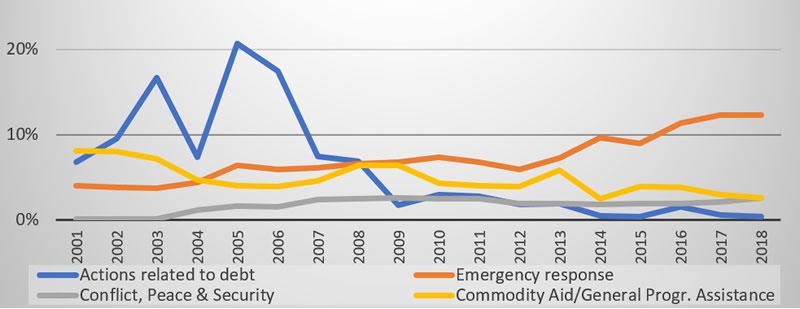Written by Carlo Pietrobelli and Antonio Vezzani of the Department of Economics, Roma Tre University, Italy
About 10 years after the financial crisis the world has been hit by another global crisis, but very different in nature.
This time people, countries and social systems are exposed to the threat of a micro-organism, the so called COVID-19, which brought the crisis in our houses.
Much about the coronavirus is outside our control, and this generates a sense of helplessness and leaves a trail of insecurity in our daily lives.
Even worse, in most countries we were used to a lengthening of life expectancy, whilst today already at 60 ‘you are at risk’.
Uncertainty is rising. Uncertainty about the future is bad for itself, but also because it lowers the perceived value of long-term investment and of basic research and innovation.
Why is this important?

There are at least three good reasons for concern.
-
During the last decades there has been a retreat of governments from public research (Archibugi and Filippetti, 2018) going hand in hand with a shift away from science by large corporations (Arora et al., 2017). This apparent move toward investments in short-term innovation may jeopardize long-term growth and development. The sudden rise of uncertainty due to COVID-19 may make things worse.
-
In the developing world, development aid has gradually but significantly shifted towards emergency response actions, and away from general assistance and debt relief (Graph 1). Apparently, the world (or at least part of it) is increasingly living in a state of emergency with a shortening of the investment time horizon.
-
The difficulty of reaching an agreement in the EU about how governments can fund the necessary actions to face the current crisis without curtailing future investment and the provision of public goods should ring warning bells. Since the onset of the last financial crisis, actions related to debt relief have practically disappeared: will debt issues come back once again with the increased uncertainty induced by the virus? Will this concern hamper necessary long-term investments?

The COVID emergency puts on the spotlight the need to build resilient socio-economics systems. However, paraphrasing Perrings (2006): “As in portfolio theory, there may be a trade-off between productivity and resilience. The most resilient systems in the long term are not necessarily the most productive in the short term”. We should consider this possibility seriously, and think about how each country, considering its specificities, may strengthen the resilience of its socio-economic system.
How can countries build their resilience? An essential element is the strengthening of their capabilities, the complex blend of abilities, knowledge and methods necessary to operate technology and improve upon it (CEPAL, 2020); this is a crucial point. Furthermore, in addition to the well-known problems of non-excludability and externalities of innovation, the new widespread uncertainty makes public research more socially valuable; supporting technology transfer and public-private partnerships may foster innovation and capabilities’ development and accelerate their usefulness for industrial applications. Investment in public research and in the infrastructures supporting knowledge production and diffusion should be given the highest consideration beyond market and debt-related concerns. Zero interest loans, debt relief and other solutions may provide the necessary financial tools (Brown and Summers, 2020).
Is this costly? Maybe, but “…. US investments in science also pale in comparison with the latest epidemic’s likely costs to the economy, not to mention lost stock-market value” (Stiglitz, 2020). Otherwise said, it is a “cost” that we should be happy to incur considering that waves of scientific advances (and not a single innovation) pave the way for the future, and that the new uncertainty threatens to stifle scientific advances.
Similarly, while we should guarantee a fast solution for this crisis, we should also be aware that this will not be the last shock hitting the world. There will be a flood of resources towards coronavirus-related research and probably reflections on the eventual re-organization of health systems. However, we cannot be sure of how the next shock will look like. Pandemic diseases have been the subject of many science-fiction novels, but many other threats easily come to our minds, already frightened by the present pandemic. Basic research and innovation on a broad spectrum represent the best form of building insurance and resilience against the future.
[The views expressed in this article are those of the author(s) and do not necessarily reflect the views of the UNCTAD secretariat]
References
Archibugi, D., & Filippetti, A. (2018). The retreat of public research and its adverse consequences on innovation. Technological Forecasting and Social Change, 127, 97-111. https://eprints.bbk.ac.uk/19795/6/19795.pdf
Arora, A., Belenzon, S., & Patacconi, A. (2018). The decline of science in corporate R&D. Strategic Management Journal, 39(1), 3-32.https://onlinelibrary.wiley.com/doi/pdf/10.1002/smj.2693?casa_token=W95Wq2ECXBoAAAAA:SFJkwdiVMKdBvEA6Kx_sTW1rk4AcZmr3IkbbjPIkfTJtarNkR8I0qLnqI1WVDzHYYx04ihEqKtS-Mus
Brown G. and Summers L.H., 2020, “Debt Relief Is the Most Effective Pandemic Aid”, Project Syndicate, April 15, 2020, https://www.project-syndicate.org/commentary/debt-relief-most-effective-covid19-assistance-by-gordon-brown-and-lawrence-h-summers-2020-04
CEPAL (2020). América Latina y el Caribe ante la pandemia del COVID-19. Efectos económicos y sociales. Informe Especial COVID-19, Comisión Económica para América Latina y el Caribe.
Perrings, C. (2006). Resilience and sustainable development. Environment and Development Economics, 11(4), 417-427. https://www.cambridge.org/core/journals/environment-and-development-economics/article/resilience-and-sustainable-development/8EB60F130B6694BD5632650811321168
Reinert, E.S. (1999). The role of the state in economic growth. Journal of Economic Studies, 26(4/5), 268–326. https://www.emerald.com/insight/content/doi/10.1108/01443589910284903/full/html
Stiglitz, J. E. (2020, 13 March), Plagued by Trumpism, Social Europe, https://www.socialeurope.eu/plagued-by-trumpism.
OECD DAC https://stats.oecd.org/viewhtml.aspx?datasetcode=TABLE5&lang=en


